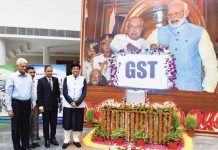
Garry Kasparov keeps me waiting for half an hour before he comes for our interview. He’s busy watching the opening moves of Game Two of the World Championship match between 44-year-old Vishwanathan Anand, a longtime rival in the latter half of Kasparov’s career, and 22-year-old Magnus Carlsen, the chess wunderkind he previously trained and has been raving about for years, who “combines the positional knowledge of Anatoly Karpov with the determination of Bobby Fischer”. The day before, he was a little disappointed that he’d miss the endgame manoeuvring in Game One because of his session at THiNK 2013; he seemed relieved when the game ended in a quick draw well before he had to leave for the auditorium.
The World Championship being played in Chennai is a constant presence in Kasparov’s trip to India. He is asked about it extensively in the press conference. He refuses to pick a favourite; though Carlsen is clearly the better player, Anand has played more championship matches, an experience that cannot be replicated. The match format, where champion and challenger play 12 games, has faced criticism over the years, most notably from Carlsen himself, who boycotted the Candidates Tournament in 2011 because he felt the format wasn’t “sufficiently modern or fair, to provide the motivation I need”. “The great thing about chess,” says Kasparov, “is the unique status of the world champion. If we count classical champions, Vishy is the 15th. We’re talking about 127 years; it’s a unique line of succession. So the World Championship match always creates huge emotions. It’s the golden hen. How could you kill it for an event that had no value?”
The event he speaks of was the championship tournaments introduced in 1997 by Fédération Internationale Des Échecs (FIDE) President Kirsan Ilyumzhinov, during an era between 1993 and 2007 when chess had two world champions. That schism took place after Kasparov, world champion since 1985, broke away with Nigel Short to form the Professional Chess Association (PCA) because he felt that chess administration had not evolved to take advantage of the end of the Cold War. “The PCA was no accident,” he says. “It was part of my belief from the mid-’80s that chess needed to move to a new level of management. We have a product that has to be packaged and sold, and FIDE was in no position to do it. [Then FIDE President Florencio] Campomanes was a product of the Cold War. He knew how to sell political elements, but he was not capable of selling chess as a game that would attract corporations.” He admits, though, that the PCA was a mistake, that he could have accomplished much more by remaining within FIDE.
It is a mistake he seeks to correct next year when he stands against Ilyumzhinov, who has been the undisputed strongman of world chess for the past 18 years since replacing Campomanes in 1995. THiNK, in a way, marks the launch of his campaign; after travelling from Goa to Chennai for Games Three and Four, he embarks on a tour of Southeast Asia, to meet national federations and garner support. Ilyumzhinov, the former president of the Russian province of Kalmykia, is a millionaire who is known less for his work for the development of the game than for his widely publicised claim in 1997 that he had been abducted by aliens (in 2010, he had to publicly declare he wasn’t working for an alien intelligence service) and for playing a game of chess with longtime friend Muammar Gaddafi shortly before the latter’s capture and execution. “If you search for Ilyumzhinov on Google, all you find are aliens and Gaddafi,” says Kasparov. “How is that going to attract sponsors?” Apart from the bad PR his eccentricities generate, Kasparov blames Ilyumzhinov for having scuttled hopes of a FIDE-PCA title reunification because of his obsession with knockout tournaments and for not possessing any long-term vision for the development of the game. He also blames FIDE for not following through on its pledge to bring chess to schools, even in a large country like India with an influential chess organisation that is close to the international body.
Kasparov was born Garik Kimovich Weinstein in 1963 in Baku, now Azerbaijan, to a Russian Jewish father and an Armenian mother. He would later adopt a Russian version of his mother’s surname, Gasparyan, in what was perhaps a move to escape both antisemitism and a bias against non-Russians in the former Soviet Union. He began playing chess at the age of six and soon started winning tournaments with regularity. By age 13, he was Soviet youth champion; by 16, he had won his first international senior tournament. He wasn’t, he says, a moody, solitary chess player like, say, Fischer, but a fairly sociable child. “One of the problems is to actually defy the wrong image of the game that was created not only by Fischer but by chess literature. The two books everybody cites are Chess Story by Stefan Zweig and Vladimir Nabokov’s The Luzhin Defense. Both books give a portrait of a great chess player, but it’s not one you want your kids to follow. This does a great disservice to the game.”
He may have been a companionable person, but staring you down across 64 squares, he was ruthless, beating you not only through his inventive play but also his physical and mental stamina. The world learned all about that in 1984, when the then 21-year-old, one loss away from allowing the incumbent champion and star of the Soviet chess machine Anatoly Karpov to hold on to the title, managed to hold Karpov off for 21 games. Eventually — crucially, after Kasparov had won two games in a row to come within three wins of the title — Campomanes called the match off, citing fears for the players’ health after a five-month battle. On 9 November 1985, 28 years to the day before his session at THiNK, he beat Karpov for the title in a rematch. It was a title he would hold until 2000, when he lost to Vladimir Kramnik in a PCA-sanctioned match. He won almost 70 percent of all the games he played, held the record for most consecutive titles and the highest rating ever for a chess player, that is, until Carlsen overtook him in January this year.
In 2005, however, Kasparov retired from chess to take on a bigger challenge: Russian politics. He had joined the Communist Party in 1984, following, he says, the rules of the game. “I was not a big fan of the system, but I had experienced so many problems. To me, it was conditional to receiving support in Azerbaijan.” He would resign from the party in 1990, a year before the USSR’s collapse. He describes himself as a social liberal and a fiscal conservative, who wants “the government out of my wallet and my bed”. Following his retirement, he tried to organise opposition to Vladimir Putin’s autocratic regime, which he says only works to enrich the country’s oligarchs. Support for his challenge was mixed; while many came together around his anti-Putin platform, he has been routinely criticised for leaving chess to join politics. And for not being Russian enough. (He now lives, and his family has for years, in the US, because most of his income is from the lucrative speaking circuit.) Nevertheless, he decided to run for the presidency in 2007.
It was a battle that he would not win. On 12 December of that year, he was forced to withdraw from the race because he had not managed to rent a hall to house enough people to endorse his candidature. Today, Putin seems as strong as ever, while the opposition has succumbed to infighting, losing successive elections at various levels. Kasparov has receded from the fight, in deference to the younger generation, training his guns instead on Ilyumzhinov, a staunch Kremlin ally. But he refuses to accept that Putin enjoys the country’s support, insisting that only free and fair elections will prove that. “In chess,” he memorably said during his session, “there are fixed rules and predictable outcomes. In Russian politics, it is precisely the opposite.”








